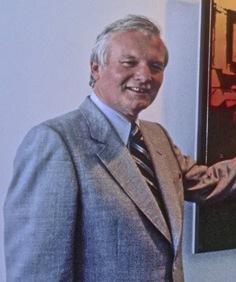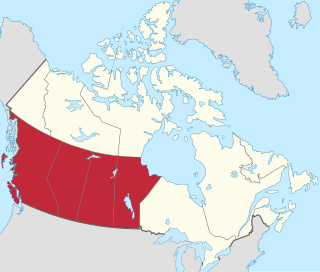Related Research Articles
A by-election,also known as a special election in the United States and the Philippines,a bye-election in Ireland,and a bypoll in India,is an election used to fill an office that has become vacant between general elections,

The Co-operative Commonwealth Federation was a federal democratic socialist and social-democratic political party in Canada. The CCF was founded in 1932 in Calgary,Alberta,by a number of socialist,agrarian,co-operative,and labour groups,and the League for Social Reconstruction. In 1944,the CCF formed one of the first social-democratic governments in North America when it was elected to form the provincial government in Saskatchewan.

John Edward Broadbent was a Canadian social-democratic politician and political scientist. He was leader of the New Democratic Party (NDP) from 1975 to 1989,and a member of Parliament from 1968 to 1990 and from 2004 to 2006. He led the NDP through four federal elections. He oversaw a period of growth for the party with its parliamentary representation rising from 17 to 43 seats as of the 1988 federal election.
Social conservatism is a political philosophy and a variety of conservatism which places emphasis on traditional power structures over social pluralism. Social conservatives organize in favor of duty,traditional values and social institutions,such as traditional family structures,gender roles,sexual relations,national patriotism,and religious traditions. Social conservatism is usually skeptical of social change,instead tending to support the status quo concerning social issues.
In Canadian politics,a leadership convention is held by a political party when the party needs to choose a leader due to a vacancy or a challenge to the incumbent leader.

The New Zealand Social Credit Party was a political party that was New Zealand's third party from the 1950s to the 1980s. It was elected to the New Zealand House of Representatives,holding one seat at times between 1966 and 1981,and two seats from 1981 to 1987. It was named the New Zealand Democratic Party from 1985 to 2018,and was part of the Alliance party from 1991 to 2002. It returned to the Social Credit name in 2018. The party deregistered itself in early 2023.

The New Democratic Party of Manitoba is a social-democratic political party in Manitoba,Canada. It is the provincial wing of the federal New Democratic Party,and is a successor to the Manitoba Co-operative Commonwealth Federation. It is currently the governing party in Manitoba.

The Nova Scotia New Democratic Party is a social-democratic,progressive provincial party in Nova Scotia,Canada. It is the provincial entity of the federal New Democratic Party (NDP). It was founded as the Co-operative Commonwealth Federation (CCF) in 1932,and became the New Democratic Party in 1961. It became the governing party of Nova Scotia following the 2009 Nova Scotia election,winning 31 seats in the Legislature,under the leadership of Premier Darrell Dexter. It is the first New Democratic Party in Atlantic Canada to form a government,and the second to form a government in a province east of Manitoba. The party lost government at the 2013 election,losing 24 seats,including Dexter's seat. Gary Burrill,the party’s leader from 2016 to 2022,is credited with bringing the party back to its left-wing roots. The party currently holds 6 seats in the Legislature and has been led by Claudia Chender since June 2022.

The Newfoundland and Labrador New Democratic Party is a social democratic political party in Newfoundland and Labrador,Canada. It is a provincial section of the federal New Democratic Party. It was formed in 1961 as the successor to the Co-operative Commonwealth Federation (CCF) and the Newfoundland Democratic Party. The party first contested the 1962 provincial election. The party won its first seat in the House of Assembly in 1984 and has been represented in the legislature since 1990.

William Donald Dennison was a Canadian social-democratic politician who served in both the Ontario Legislative Assembly and finally as the City of Toronto's mayor. He served two nonconsecutive terms as a Member of Provincial Parliament (MPP) in the 1940s and early 1950s. After his provincial-level career,he focused on Toronto's municipal politics,holding offices as an alderman,member of the Toronto Board of Control,and finally as the city's mayor. He was the mayor from 1967 to 1972,winning two consecutive three-year terms. Prior to entering politics,he was a school principal and teacher. As of 2022,he was the last mayor of Toronto to be a member of the Orange Order.

The 1981 Ontario general election was held on March 19,1981,to elect members of the 32nd Legislative Assembly of the Province of Ontario,Canada.

The Co-operative Commonwealth Federation (Manitoba) (CCF),known informally as the Manitoba CCF,was a provincial branch of the national Canadian party by the same name. The national CCF was the dominant social-democratic party in Canada from the 1930s to the early 1960s,when it merged with the labour movement to become the New Democratic Party. The Manitoba CCF,created in 1932,played the same role at the provincial level.
The New Democratic Party of Prince Edward Island is a social-democratic political party in the Canadian province of Prince Edward Island,and a branch of the federal New Democratic Party (NDP).
Alphonsus (Fonse) Faour is a former Canadian politician. Faour represented the electoral district of Humber—St. George's—St. Barbe,which he won in a 1978 by-election following the resignation of Jack Marshall. In the general election the following year,Faour retained the renamed seat of Humber—Port au Port—St. Barbe. However,in the 1980 election,Faour was defeated by Brian Tobin.

Socialism in Canada has a long history and along with conservatism and liberalism is a political force in Canada.
The New Democratic Party is a federal political party in Canada. Widely described as social democratic,the party occupies the centre-left to left-wing of the political spectrum,sitting to the left of the Liberal Party. The party was founded in 1961 by the Co-operative Commonwealth Federation (CCF) and the Canadian Labour Congress (CLC).

Western Canada,also referred to as the Western provinces,Canadian West or the Western provinces of Canada,and commonly known within Canada as the West,is a Canadian region that includes the four western provinces just north of the Canada–United States border namely British Columbia,Alberta,Saskatchewan and Manitoba. The people of the region are often referred to as "Western Canadians" or "Westerners",and though diverse from province to province are largely seen as being collectively distinct from other Canadians along cultural,linguistic,socioeconomic,geographic and political lines. They account for approximately 32% of Canada's total population.
Populism in Canada has been part of the country's political culture through its history and across the political spectrum. Populist parties and movements have included the Canadian social credit movement which achieved electoral strengths in Western Canada and to some extent in Quebec in the early to mid 20th century,and the Reform Party of Canada which became the largest conservative party in Parliament from a base in Western Canada in the 1990s.
Centrism is a political outlook or position involving acceptance or support of a balance of social equality and a degree of social hierarchy while opposing political changes that would result in a significant shift of society strongly to the left or the right.

The Social Democratic Party (SDP) was a centrist to centre-left political party in the United Kingdom. The party supported a mixed economy,electoral reform,European integration and a decentralised state while rejecting the possibility of trade unions being overly influential within the industrial sphere. The SDP officially advocated social democracy,but its actual propensity is evaluated as close to social liberalism.
References
- 1 2 Leo Heaps, Our Canada: The Story of the New Democratic Party Yesterday, Today and Tomorrow. Lorimer, 1991. ISBN 1550283537.